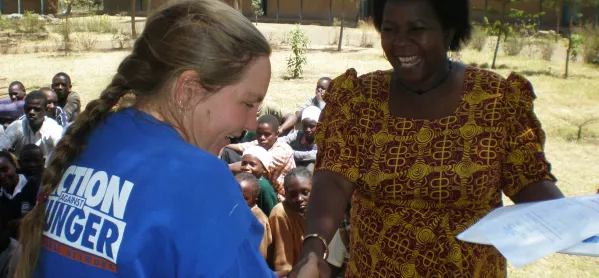‘Education is a life skill’: teachers plan the world’s largest lesson

In the schools in rural Congo where Trayle Kulshan worked, children often had no pencils, no uniforms and, occasionally, no teachers. They were, however, usually able to list from memory the United Nation’s Millennium Development Goals.
Now, the science teacher works in a private international school in Dubai. Here, her pupils fight over iPhones and internet time, but are barely aware of the need for development goals.
It was in order to try and educate pupils like those in Dubai that Ms Kulshan (pictured) entered her lesson plan for a competition to help organise the world’s largest lesson.
Led by screenwriter Richard Curtis and children’s charity Unicef, and backed by TES, the World’s Largest Lesson project aims to communicate the new Global Development Goals to as many schoolchildren as possible within the space of a single week this month.
The Global Goals - announced this month - pick up where the Millennium Goals left off. The aim is that they will facilitate the eradication of extreme poverty within the next 15 years. Teachers were therefore asked to submit lesson plans that could be used to teach about one or more of these goals.
Eight winners from around the world were then selected, among them Ms Kulshan. “Even primary-school kids could talk about Unicef and the Millennium Development Goals,” she says of the children she worked with during a decade as a humanitarian-aid worker. “My privileged kids know what Unicef is, but probably as no more than the sponsor of a football team.”
But she hopes that her winning lesson plan will help her current pupils to understand the trials faced by children in sub-Saharan Africa. “Building toilets isn’t sexy,” she says. “But a kid won’t come to school because they can’t use the bathroom there. Little things like that make a huge difference in even getting an education at all.”
Eddie Costello, an Australian who teaches at an international school in Taiwan, had similar motives for entering the competition. His pupils are largely the children of CEOs of big companies. “They think that going without means not having the latest iPhone,” he says.
As a result, he feels that it is his duty to help them understand the world around them. “They might just think, ‘I’m just this kid - I’ve got no say in anything’,” he says. “But everyone can make a contribution, and every contribution adds up. If we all hold a little piece of the puzzle, we can put it together and make it all fit.”
The aim is that the world’s largest lesson will enable teachers in impoverished schools, such as those where Ms Kulshan worked, to deliver the same lessons being given to pupils in elite private schools.
The project’s organisers are asking teachers in schools around the world to spend between half an hour and an hour introducing the Global Goals to pupils during the week of 27 September.
They should do this using a range of online teaching resources, including the winning teachers’ lesson plans. (“It’s a bummer that there’s no internet access everywhere,” says Ms Kulshan.)
Economics teacher Kanaka Durga, who works in an international school in the Indian city of Hyderabad, feels particularly strongly that the lesson should be delivered in all schools, not just those where pupils already have access to considerable resources.
“People studying in international schools and private schools, they do not know what’s the situation maybe 10, 20 kilometres away from them,” she says. “Children must be more reciprocal in society. I myself feel sometimes: why am I teaching in an international school? Whenever I get a chance, I should reach out to other people.”
This is echoed by Ayswarrya Ganapathiraman, who is currently working in Brazil but is originally from Bombay. There, she used to give lessons to illiterate street children, teaching them reading, maths and English.
“Education isn’t a privilege,” she says. “It’s a life skill. It’s something that’s going to help them to live better.”
The eight winning teachers are:
Eddie Costello, Hsinchu International School, Taiwan
Kanaka Durga, Oakridge International School, India
Ayswarrya Ganapathiraman, Percutz School, Brazil
Lindsey Hassan, Wingrove Primary School, England
Sharee Ineson, Southlands Girls’ High School, New Zealand
Collins Abalu, Ladela Secondary School, Nigeria
Trayle Venus Kulshan, Raffles World Academy, Dubai
Nevena Stoilkov, Milisav Nikolic Elementary School, Serbia
For more information, visit the World’s Largest Lesson website
Keep reading for just £1 per month
You've reached your limit of free articles this month. Subscribe for £1 per month for three months and get:
- Unlimited access to all Tes magazine content
- Exclusive subscriber-only stories
- Award-winning email newsletters



